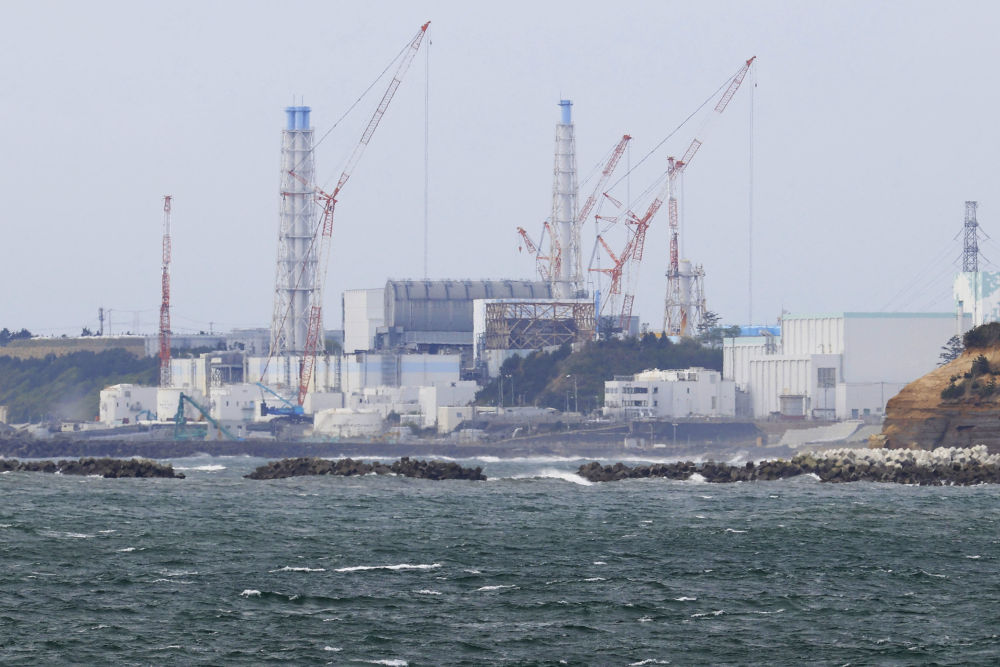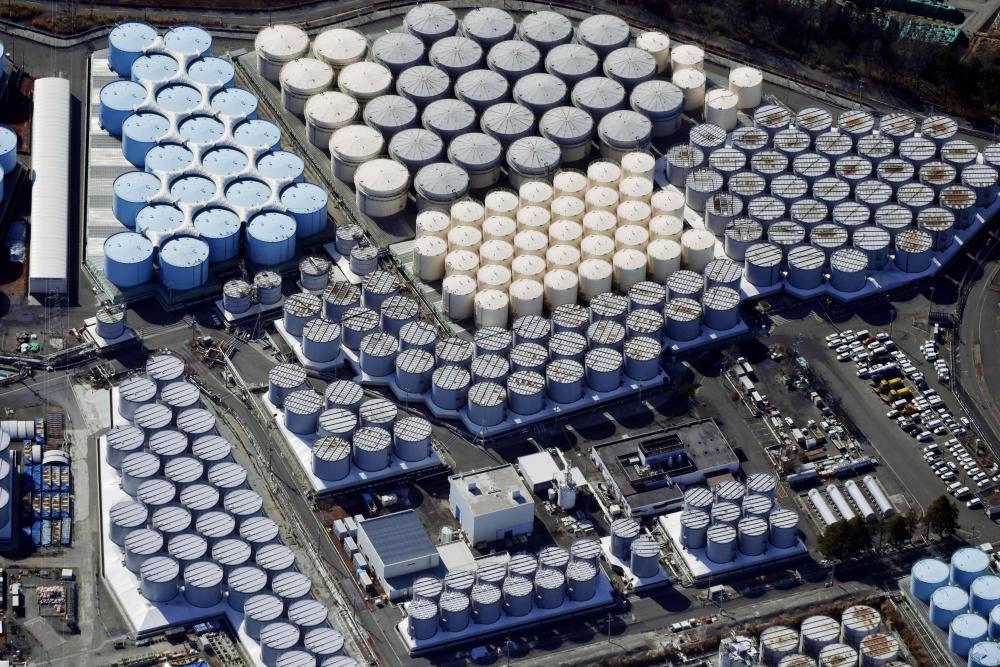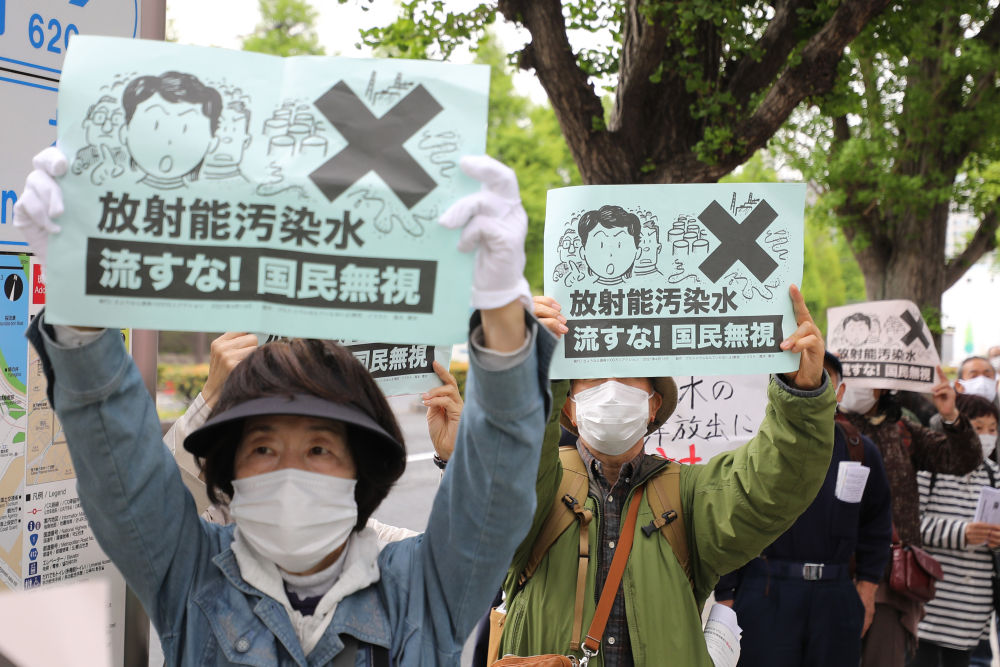Xinhua News Agency, Tokyo, July 23rd Japan’s nuclear regulatory agency, the Atomic Energy Regulatory Commission, held a meeting on the 22nd, officially approving the plan of Tokyo Electric Power Company (hereinafter referred to as TEPCO) to discharge nuclear polluted water into the sea at the Fukushima Daiichi nuclear power plant. According to this plan, TEPCO will start to discharge nuclear polluted water next spring if the local government agrees again.
Analysts pointed out that in April last year, the Japanese government officially decided to discharge nuclear polluted water into the Pacific Ocean despite strong opposition at home and abroad. Over the past year or so, despite the rising opposition at home and abroad, the Japanese side turned a deaf ear and pushed forward the discharge of nuclear polluted water into the sea, which is extremely irresponsible and will cause serious harm to the global marine environment.

This is the Fukushima Daiichi nuclear power plant in Japan, which was shot on April 13th, 2021. (Xinhua News Agency/Kyodo News Agency)
Push hard
In April this year, Japan Atomic Energy Regulatory Commission ignored domestic and international objections and doubts, and "generally agreed" to TEPCO’s emission plan, forming a draft "review book". After confirming the draft of the "review book" in May, the Committee said that the draft was "no problem" and entered the public consultation session.
According to reports, 670 of the more than 1,200 opinions collected publicly are technical opinions, including concerns about the determination of the concentration of nuclear contaminated water and the earthquake resistance of equipment. Despite this, after discussing the opinions collected on the 22nd, the Atomic Energy Regulatory Commission said that TEPCO’s response was "appropriate" and approved its plan to discharge nuclear polluted water into the sea.
After the Fukushima nuclear accident in March, 2011, a large amount of nuclear polluted water was produced to continuously cool the nuclear reactor whose core melted. TEPCO has prepared about 1,000 water storage tanks for storing nuclear contaminated water at the Fukushima Daiichi nuclear power plant. With the available capacity of water storage tanks getting less and less, the Japanese government held a cabinet meeting in April last year and formally decided to filter and dilute these nuclear polluted water and discharge it into the sea.

This is the nuclear sewage storage tank of Fukushima Daiichi nuclear power plant, Japan, which was photographed on February 13, 2021. (Xinhua News Agency/Kyodo News Agency)
Analysts pointed out that although the emission plan was nominally formulated by TEPCO, in fact, it could not be completed without the participation and support of the Japanese government.
According to Japanese media reports, in addition to promoting the approval of emission plans, Japan is also stepping up the construction of sea-discharge pipelines. At the end of April this year, TEPCO started the construction of the outlet of the submarine tunnel for discharging nuclear polluted water, with the goal of completing related projects in April 2023.
make irresponsible remarks
At present, all parties are generally concerned about the impact of Japan’s discharge of nuclear polluted water on the marine environment and people’s health in countries along the Pacific Ocean. At the same time, questions are raised about the legitimacy of the nuclear polluted water discharge scheme, the reliability of Japanese data, the effectiveness of purification devices and the controllability of environmental impact. Grossi, Director General of the International Atomic Energy Agency, pointed out in an interview last year that Japanese nuclear waste water discharged into the Pacific Ocean should not cause environmental damage.
The International Atomic Energy Agency set up a technical working group to visit and evaluate Japan twice. So far, it has not reached a conclusive opinion on Japan’s sea discharge plan, and at the same time, it has put forward many clarification requirements and improvement opinions. China and Russia submitted a joint technical questionnaire to the Japanese side, and they still haven’t received feedback from the Japanese side. Not long ago, the leaders’ meeting and foreign ministers’ meeting of the Pacific Island Forum also expressed serious concern about related issues.
In this regard, the Japanese side not only deliberately avoided these questions, but also made irresponsible remarks and tried to cover up the harm. The Japanese side claimed that before the Fukushima nuclear polluted water was discharged into the sea, it had to be filtered by "Multi-nuclide Removal Equipment" (ALPS) to remove more than 60 radioactive substances. Tritium, which is difficult to be removed by the equipment, will be diluted to a concentration far lower than the Japanese national standard and discharged into the sea. The Japanese side also confuses the concept and confuses nuclear polluted water with waste water, saying that waste water discharged from nuclear power plants all over the world contains tritium, and it is safe to dilute it and discharge it into the sea.
In fact, Fukushima nuclear contaminated water is not tritium-containing wastewater discharged during the normal operation of nuclear power plants, and the radioactive substances contained in it are extremely complex, so it is doubtful whether it can be effectively removed. Given that the Japanese government and TEPCO have many dishonest records in dealing with the Fukushima nuclear accident, their statements are unconvincing.
Japanese media have found out that there are many radioactive substances in Fukushima nuclear polluted water beyond the standard except tritium. TEPCO also admitted that more than 70% of the nuclear polluted water treated by ALPS does not meet the discharge standards and needs to be filtered again.
strongly oppose
There have been a lot of doubts and objections in Japan and the international community about Japan’s plan to discharge nuclear polluted water into the sea. The statement made by the Japan Atomic Energy Regulatory Commission on the 22nd once again aroused serious concern, and all parties urged Japan to cancel the wrong decision to discharge nuclear polluted water into the sea.

On April 13, 2021, protesters opposed the discharge of Fukushima nuclear polluted water into the sea outside the Prime Minister’s residence in Tokyo, Japan. (Photo by Xinhua News Agency reporter Du Yiyi)
People from Tokyo, Chiba and Fukushima held protests that day. The people who participated in the event said that the decision of the Atomic Energy Regulatory Commission is related to the future of Fukushima and the marine environment, but it is very irresponsible to make such an important decision without fully informing the Japanese people. Some people also said that they are resolutely opposed to discharging nuclear polluted water into the sea, and Japan can no longer pollute the ocean and pollute the earth.
The National Federation of Fishery Associations of Japan held a meeting in Tokyo a few days ago and unanimously adopted a special resolution of "reaffirming the position of resolutely opposing the discharge of nuclear polluted water from Fukushima into the sea". This is the third time that the group has passed a resolution against the discharge of Fukushima nuclear polluted water into the sea.
Japan’s irresponsible behavior triggered strong opposition from neighboring countries. The South Korean government said on the 22nd that it was worried about the Japanese nuclear regulatory agency’s approval of discharging pollutants into the sea, and it would take countermeasures. At the same time, South Korea will also strengthen cooperation with the International Atomic Energy Agency and strengthen the detection of domestic marine environmental radiation.
China’s Ministry of Foreign Affairs reiterated on the 22nd that the disposal of nuclear polluted water in Fukushima is related to the global marine environment and the public health of Pacific Rim countries, and is by no means a private matter of Japan. China once again urges Japan to earnestly fulfill its due international obligations, dispose of nuclear polluted water in a scientific, open, transparent and safe way, and stop pushing the plan of discharging the sea. The Ministry of Foreign Affairs of China emphasizes that before full consultation and agreement are reached with stakeholders and relevant international institutions, shall not start the discharge of nuclear polluted water into the sea without authorization. If Japan insists on putting its own self-interest above the international public interest and taking a dangerous step, it will pay the price for its irresponsible behavior and leave a historical stain.
关于作者